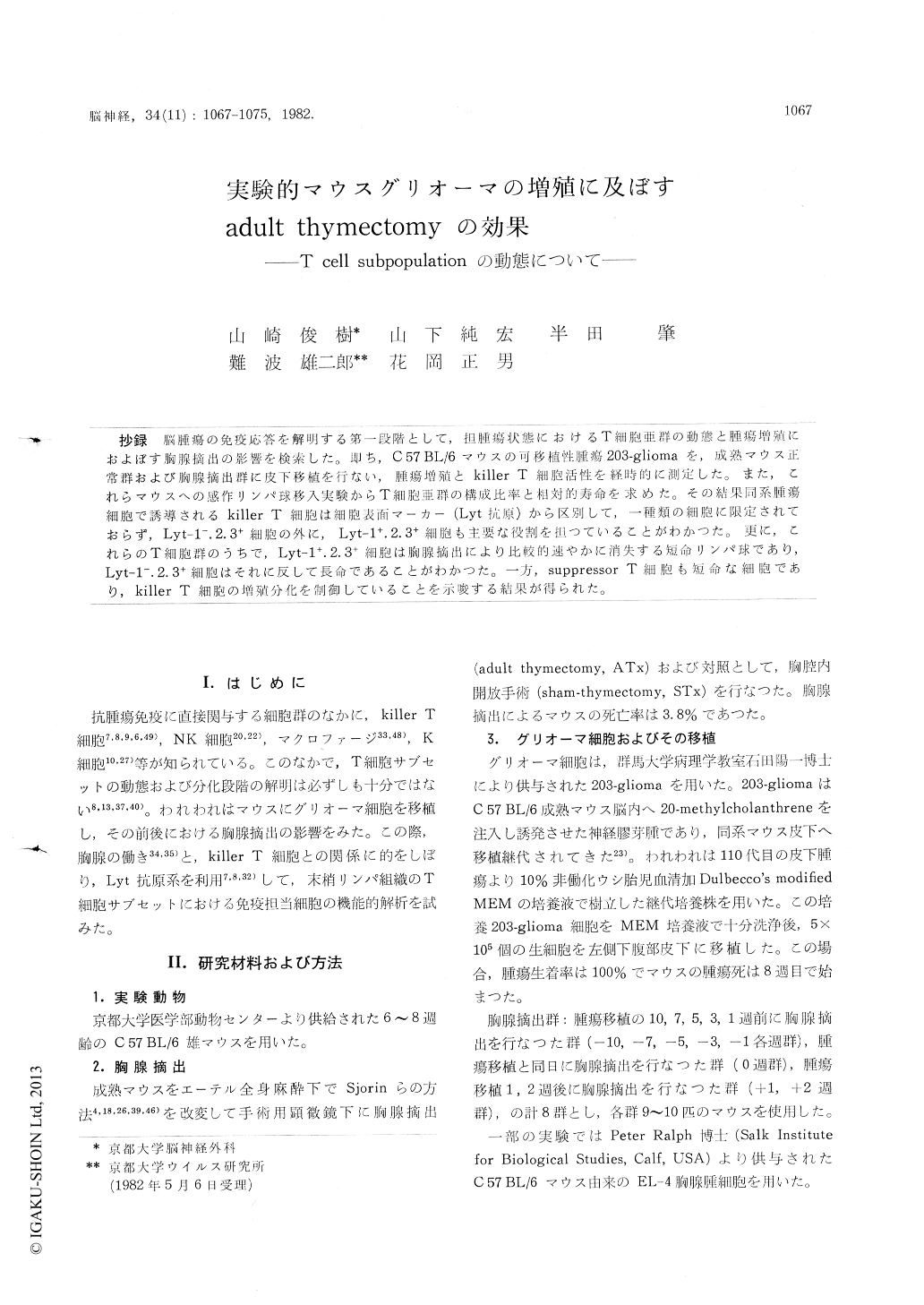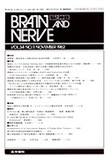Japanese
English
- 有料閲覧
- Abstract 文献概要
- 1ページ目 Look Inside
抄録 脳腫瘍の免疫応答を解明する第一段階として,担腫瘍状態におけるT細胞亜群の動態と腫瘍増殖におよぼす胸腺摘出の影響を検索した。即ち,C57 BL/6マウスの可移植性腫瘍203—gliomaを,成熟マウス正常群および胸腺摘出群に皮下移植を行ない,腫瘍増殖とkiller T細胞活性を経時的に測定した。また,これらマウスへの感作リンパ球移入実験からT細胞亜群の構成比率と相対的寿命を求めた。その結果同系腫瘍細胞で誘導されるkiller T細胞は細胞表面マーカー(Lyt抗原)から区別して,一種類の細胞に限定されておらず,Lyt−1—.2.3+細胞の外に, Lyt−1+.2.3+細胞も主要な役割を担つていることがわかつた。更に,これらのT細胞群のうちで,Lyt−1+.2.3+細胞は胸腺摘出により比較的速やかに消失する短命リンパ球であり,Lyt−1—.2.3+細胞はそれに反して長命であることがわかつた。一方, suppressor T細胞も短命な細胞であり,killer T細胞の増殖分化を制御していることを示唆する結果が得られた。
The effects of adult thymectomy in C 57 BL/6 mice on in vivo and in vitro responses to syn-geneic methylcholanthrene-induced glioma (203-glioma) were investigated in order to analyse the role of T cell subpopulation in relation to the antitumor immunity. The tumor growth in adult mice thymectomized 3 weeks before subcutaneous inoculation of tumor cells was significantly sup-pressed. On the other hand, in mice thymecto-mized 7 or 10 weeks before tumor cell inocula-tion, the tumor growth was enhanced resulting in shorter mean survival time. The cytotoxic activity of the regional lymph node T cells in the former mice was increased from the beginning after tumor cell inoculation with peak observed on day 14 and maintained for about 4 weeks, while it was extremely decreased in the latter mice. The marked enhancement of cytotoxic acti-vity in the former mice is probably due to a reduced proportion of short-lived T lymphocyte population after adult thymectomy. In contrast,the low level of cytotoxic activity in the latter mice may be due to a gradual reduction of long-loved T lymphocyte population in addition to short-lived T lymphocyte population after adult thymectomy. The cytotoxic activity was specific for 203-glioma cells and almost completely elimi-nated with anti-Thy-1 monoclonal antibody and complement. The surface markers of these killer T cells were checked with the results that in normal mice Lyt-1-.2.3+ and Lyt-1+. 2. 3+ cells participate in cytotoxic reaction. In mice thy-mectomized 3-10 weeks before tumor cell inocula-tion, however, Lyt-1+.2.3+ killer T cells were not detected suggesting strongly that the pro-genitors of Lyt-1+.2.3+ killer T cells are short-lived cells in contrat to those of Lyt-1-.2.3+ killer T cells which survive more than 10 weeks after adult thymecomy. The tumor growth was also significantly suppressed by the intravenous adoptive transfer of sensitized lymphocytes ob-tained from mice thymectomized 3 weeks before tumor cell inoculation. This effect of tumor sup-pression was disappeared by the pretreatment of infused lymphocytes with anti-Thy-1 monoclonal antibody and complement.
These evidences may suggest that in tumor bearing mice short-lived suppressor T cells or their precursors exist and regulate the growth and differentiation of killer T cells and that adult thymectomy affects immunoregulation, possi-bly by altering the generation of suppressor T cells.

Copyright © 1982, Igaku-Shoin Ltd. All rights reserved.


